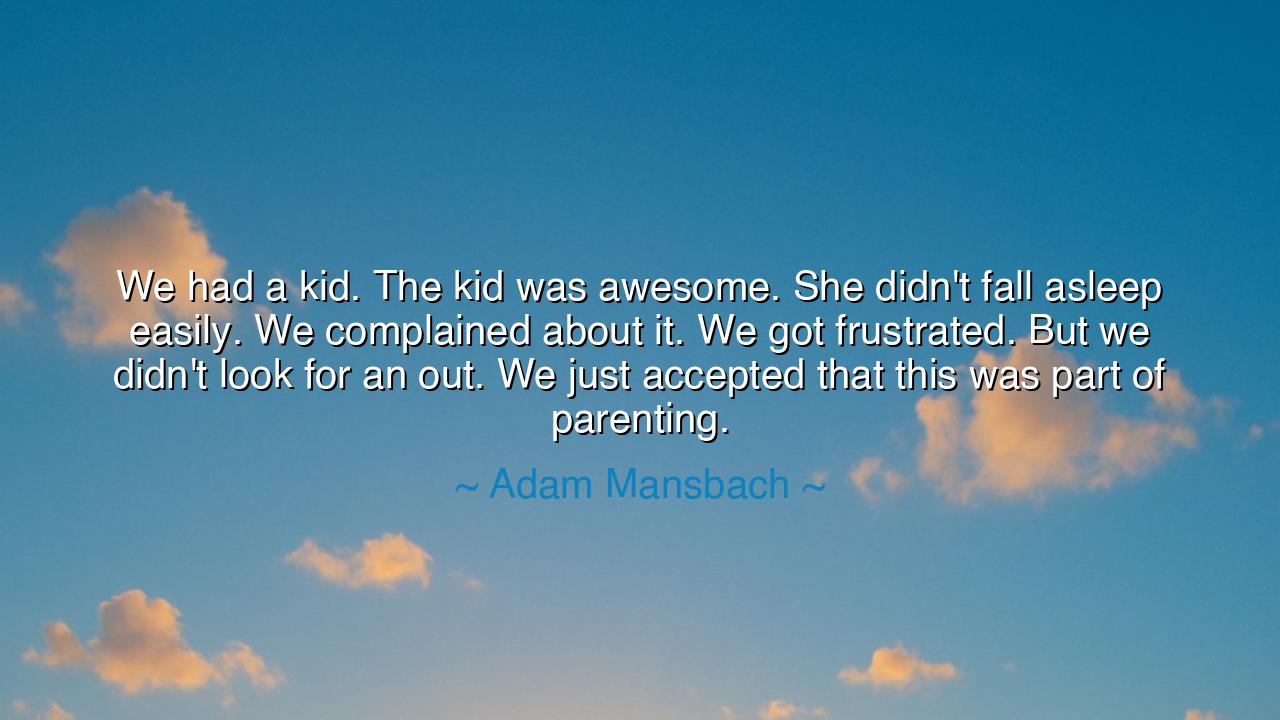
We had a kid. The kid was awesome. She didn't fall asleep
We had a kid. The kid was awesome. She didn't fall asleep easily. We complained about it. We got frustrated. But we didn't look for an out. We just accepted that this was part of parenting.






When Adam Mansbach spoke the words: “We had a kid. The kid was awesome. She didn’t fall asleep easily. We complained about it. We got frustrated. But we didn’t look for an out. We just accepted that this was part of parenting,” he offered a truth both humble and enduring. His words reflect the essence of parenting: that it is not a path of perfection or ease, but one of endurance, patience, and acceptance. For every child, no matter how “awesome,” will bring challenges — and to face those challenges without retreat, without searching for escape, is the very heart of the parental calling.
The origin of this insight lies in Mansbach’s own experiences as a father, which famously inspired his humorous but heartfelt reflections on bedtime struggles in his work Go the F** to Sleep*. Yet behind the humor is wisdom: the recognition that frustration is not failure. To feel weary, to complain, even to grow exasperated — these are natural. But what defines a parent is not the absence of frustration, but the refusal to abandon the task. To “not look for an out” is to embrace parenting as it truly is: imperfect, exhausting, yet sacred.
This truth is echoed across history. Consider the life of Theodore Roosevelt, who, after the death of his first wife, was left with the responsibility of raising his young daughter Alice. He faced sleepless nights, grief, and the demands of public service. He complained, he struggled, but he never sought escape from the role of father. Instead, he accepted the burden and joy together, knowing that parenting was not meant to be easy, but to be transformative. Like Mansbach, he found that resilience in the face of struggle was itself the mark of love.
Mansbach’s words carry a deeply emotional resonance. In them is the recognition that frustration does not mean failure, and struggle does not mean one is unworthy. Parents who feel exasperated at their children’s sleeplessness, tantrums, or stubbornness are not alone. What matters most is what follows the frustration: the return to patience, the refusal to give up, the acceptance that these struggles are not interruptions to parenting but an inseparable part of it. The child is not broken for being difficult, nor is the parent broken for feeling weary. Both are simply human.
The wisdom here is also heroic in its simplicity. To accept hardship without seeking escape is the work of the warrior, the pilgrim, the builder of generations. Every parent who chooses to stay present, to keep rocking the sleepless child, to keep guiding through storms of defiance, joins the lineage of countless mothers and fathers who endured before them. Their quiet perseverance is a heroism greater than glory on the battlefield, for it ensures the survival and growth of the future itself.
The lesson is clear: parenting is not a task to be mastered quickly or escaped when hard. It is a journey filled with joy and struggle intertwined. Complaints may be voiced, frustration may flare, but let them be passing winds. What must remain constant is the acceptance that these challenges are part of the sacred duty. To endure them with love, even imperfectly, is to succeed. To seek only ease or escape is to betray the very heart of parenting.
Practical actions follow: parents should give themselves permission to feel frustration without shame, but also cultivate endurance. Remind yourself that difficulty is not a sign of failure, but of reality. Create rituals of patience — deep breaths, shared responsibilities, moments of humor — to help carry the weight of exhaustion. Support other parents without judgment, offering solidarity rather than advice when they confess their struggles. For in unity, the burdens are lighter.
So let Adam Mansbach’s words echo like ancient wisdom: the struggles of parenting are not flaws, but the path itself. To accept them is to grow. To endure them is to love. And to love, even in the midst of exhaustion and complaint, is the highest calling of a parent. For the child is not only “awesome” in their joys, but also in the challenges that teach us patience, resilience, and the unbreakable strength of the bond between parent and child.






AAdministratorAdministrator
Welcome, honored guests. Please leave a comment, we will respond soon